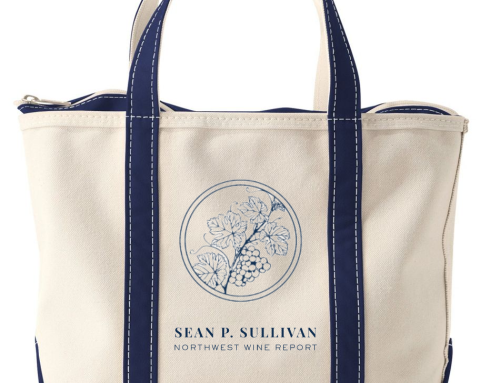
Following my last post, I wrote on Facebook that I was considering starting a memorial on-line for people to list the names of the corked bottles they had and the occasion, such as “2001 Wine Name. My Brother’s birthday.” While I was being facetious, I liked the idea of people having a space where they could commiserate about the loss of a corked bottle.
Personally, I don’t mention the names of the wineries when a bottle is corked, at least in public spaces. Why? Because 1) I believe many people will think it reflects negatively on the winery in some way – that it’s the winery’s fault and 2) it could happen to any winery using cork so why bother?
As I have thought more about this though and listened to various people’s thoughts, I have started to reconsider this position. Rather than being helpful in some way by not talking more openly about corked bottles, I feel like perhaps I am being complicit. I believe many wineries are somewhat unaware of the issue. When I say unaware, I am referring specifically to the incidence of cork taint in their wines and the resulting effects. I believe this is because most consumers do not say anything.
In terms of consumers, let’s focus on two types – the average wine drinker who buys a bottle and goes home and opens it that night or that week, and the wine collector who buys and ages wine for later consumption.
In terms of the average wine drinker, one of three things happens when they have a corked bottle of wine. The first is the person doesn’t realize the bottle is tainted; they just think the wine is bad. This person is unlikely to buy from your winery/wine store again unless they have some compelling reason to. For a long time when I had a corked bottle of wine, I was like a rat responding to a toxin. It would be some time before I would buy another bottle from that winery or pull one from the cellar. This is even after I knew better. The fear of another corked bottle was still there.
The second scenario is the person who realizes that the wine is corked and brings it back to the place they bought it. For wineries, this is your best case scenario. I would be interested to hear from retailers and wineries how often people return corked bottles. Is it even slightly close to the incidence rate of corked wines? What about all those other missing bottles? For many, bringing a bottle of wine back to the store and saying that there is something wrong with it is intimidating not to mention a hassle. The third scenario is the person who realizes the wine is corked and doesn’t bother to return it. How many of these scenarios are damaging to your winery and your brand?
Now let’s talk about the second type of consumer, the collector who buys and ages wine for later consumption. This person saves wines for special moments, deliberating over when to open that special bottle. “No. Not that one. I’m saving it for a special occasion.” An entire event, Open That Bottle Night, was generated around this phenomenon. For aged wines, there is no ability to replace the bottle when it is tainted. The money is long, long gone. The experience it was meant for is affected. Sure, a person can contact the winery and ask for another bottle. Talk about a pain in the neck. Chances are if a person does contact the winery, they will get a bottle from a newer vintage. Not the same bottle at the same moment it was planned for. Not the same. And for high-end wineries, aren’t these the exact people you want to be buying your wines in the future? Do you really think this isn’t going to have some effect?
If you are not a wine collector and are having a hard time imagining what having a long saved bottle of wine end up being corked must be like, let me try to bring this scenario to life for you. Remember the movie Sideways? During the movie, Miles talks about a particular bottle of wine he is saving, a 1961 Chateau Cheval Blanc, that he has been waiting for the perfect opportunity and person to drink the bottle with. In the movie’s darkest moment, Miles drinks the bottle at a fast food restaurant, pouring the wine under the table into a paper cup. What could be sadder than that? Imagine if you will, that he gets the girl in the end and that when he tries the wine, it’ s corked.
Most people I talk to at wineries – and most retailers – wish consumers would more readily contact them when they have a bad bottle. They know the negative effect it can have. That said, I think most would be aghast at the thought of having the names of their wines listed somewhere on a ‘Corked Memorial.’ Why? Because of the consumer perception problem it would cause which is my point exactly. There already is a consumer perception problem. It’s just a silent one.
In closing, I say to both consumers and wineries, how long can we afford to have this go on? Everybody loses when bottles are corked. To consumers I say, it’s time to speak up! Take those bottles back to where you bought them. Call up the winery and ask for a replacement. Have no shame in saying what winery a corked bottle was from. Sing it out loud. It will either be a great public education effort or, more likely, will lead wineries to reconsider their position. To wineries I say, I loved cork too. I have learned to love another. Join us!







Very interesting series, Sean. I can honestly say I've never knowingly drank a corked wine. In our case it's likely due to a few things. Drinking wines young and/or directly from tasting room tastings. Or, most likely, not recognizeing it when I've seen it. Of the few wines I've poured down the drain, they may have been corked but I just dismissed them as "bad". Next time I find one of those how about I re-cork it and send it your way; you can diagnose its TCAness or tell me its other maladies, deal?
On the quality of cork closure side of things, I've learned from my home winemaking and bottling that there are umpteen grades of cork. Higher grade, higher cost. I have the luxury of examining each cork as it goes into the bottle and even on the highest grade/cost corks (which were the only acceptable ones for my wedding wine) a few were weepers that I missed during quality control. I can imagine on a bottling line with hundreds a minute the ratio of bad corks is pretty high.
We're big into recycling/reclaiming wine components, bottles (for our own wine), labels (for collages), and corks (various crafty items). So far I haven't developed a good home recycle option for the glass closure, which were accumulating a pile of. My first thought is to use them as checkers. but they're hard to stack when I have crown my opponent :)
Hey Chris…why don't you grind up your bottles and glue the newfound 'diamond dust' onto your Rodex watches.
Uh Sean, you make the assumption that wine consumers know the essentials of 'corked' wine. You may have started a movement where a consumer may say "Oh this wine does not taste like I expected; it must be corked. I'm returning it." Then, retailers and tasting rooms will get back perfectly good wine (if returned in a couple days) and not truly 'corked' wine. Personally, it's the consumer's risk, so if it's truly bad, well you're s.o.l. but here's an customer svc. opp. for the winery/retailer. ~WAwineman
I have had two recent experiences with this very issue. ( while I would very much like to name the two wineries involved I won't).
The first winery was where I had split a case of very nice Pinot Noir with a friend. After this cellared for 5 years I opened a bottle for a special occasion. Much to my surprise it was bad. This prompeted me to open a 2nd bottle and it too was bad.
On Monday morning I contacted the winemaker and inquired if there had been an issue with this specific wine. He said no and that he would be happy to replace my two opened bottles as well as the 4 unopened bottles (different vintage of course). I agreed to this and he arranged to drive to my office and make the exchange with me. He himself had not opened any bottles from that vintage recently so he truly didn't know if something had indeed happened to that vintage.
He never asked my cellaring conditions but I did tell him that I had some of his other wines, older wines, without any issues. (he makes wines for two different wineries)
What great customer service. Needless to say I will continue to buy his wines most years; from both of the wineries he works with.
The 2nd example is as bad as it can be. They brushed it off as though it was my fault 'no issue with their products that year or any other year'. (and a friend whom I had split some cases with encountered the same thing with them).
I USED to buy from this winery on many occasions but IF I buy from them again it will be only specific products.
In the customer service industry you have got to take care of your customers if you want them to keep coming back to your product.
Chris, next time you're in Seattle let me know. I have a corked bottle of wine in the fridge I have saved for educational purposes! Very good point about the different quality levels of cork out there and the things people can do to help reduce the chance of spoilage. Thanks for the comment.
WWM, you make an important point. It is actually critical to understand that the vast, vast majority of people do not know what a corked wine smells like. They just think that it is bad wine. I agree that there could be issues with people bringing back wines just because they don't like them. But when I think about this, I don't think that's such a bad thing. Let's say a person at a wine shop recommends a wine, you buy it and don't like it. Isn't it better to go back and say, "Hey, I didn't like this wine." than to not trust the recommendations of the person again?
Anon 3:35, thank you so much for this comment. It brings up a very important point. Customer service. Your story in the second example is not the first I've heard. Here's the deal. As I said above, the best case scenario – best case – is that you do what you have done (and I applaud you for it), return the wine and have a great customer service experience. Life long customer. Every other scenario is bad. You don't return the wine. You return it and have a bad experience like you did. When something like you describe happens, it doesn't just make you less likely to buy and return bottles from that winery. It makes you less likely to return bottles to *any* winery!
Many people are intimidated to return wine. To approach a wine professional and say that there was something wrong with the bottle is not fun. Unfortunately, I have spoken with several people who have told me scenarios similar to yours. They return the bottle and the people get defensive or, in several cases I have heard about from people, they are told that the bottle is fine (be very, very glad that I wasn't writing this blog at the time that happened btw).
If you want to use cork in your bottles, and you want to sell wines that use cork, you better make sure you have the customer service to back it up.
Thanks again for the comment.
I wonder every time I watch Sideways why Miles didn't bring that '61 Cheval to Maya's house. Call her and end the feud by telling her he decided to open it and he didn't want to drink alone.
Anon, Agreed. Would have been a nice ending and saved us all from that haunting scene!
All, I've received some interesting email comments from folks regarding a few issues I have not spent much time discussing. I thought I would summarize them here.
– Differences in the taint rate of various cork producers (Not all cork is created equal).
– Differences in quality control procedures for minimizing taint at various wineries (some people do a lot and some people do a little)
– The cost associated with changing to a different closure type which is not insignificant.
– What is an allowable taint percentage for a corked wine or any flaw? Personally, I'd be very happy with 1%. I'm sure some wineries are achieving this. Looking over broad sets, I see approximately one in every 25 bottles corked.
I have taken 2 bottles back to wineries that were corked. While the persons at the counters wasn't anyone but a hired hand, they did not fight the return and exchange. Both bottles were purchased within a couple of weeks, so it wasn't hard to replace bottles with same bottles. I don't know if they were several months or years later how well it would have gone. I enjoyed your 3 part series on corked wine and the alternative closures.
Cityroute16
CityRoute16, thanks for the comment and for sharing your experience.
Sean– excellent series, thank you. It helped speed up our decision to leave cork behind and go for screwcaps. Starting with our next bottling all Trio Vintners wines will be under screwcap. We have had a few experiences with customers being unhappy with their corked wine and I see no reason to continue to put our good name at risk. I look forward to long discussions in the tasting room convincing customers that screwcaps and quality wine mix! I guess the entire winemaking industry of New Zealand can't be wrong.
Steve
Trio Vintners
With years of retail and wholesale experience in the wine biz, I have tasted many a corked bottle — and they range from muted fruit to wildly aromatic in the *bad* way of damp dog/wet cardboard that is typical of TCA. Having thousands of customer interactions under my wine bib, my experience is that approx. 85% of the customer base wouldn't recognize TCA if it bit their palate; all they know is that something is wrong. Very few of that 85% will return a wine to their retailer but those who do should receive special handling from that retailer. If they don't, they should find another place to vote with their dollars.
The other 15% is the enthusiast portion of the market, the educated wine customer who has some idea as to what TCA is and how to identify it. These folks usually don't have a problem in returning such a bottle, mainly because they've had enough experience to accurately identify the problem and recognize that, while it's annoying and disappointing, unfortunately it's all too-common an occurrence. According to whom you believe, it's estimated that 3-7% of all wines bottled with cork suffer from some degree of TCA contamination.
Yes, it should be a learning moment for all of us in the wine-supply chain and NO customer should be rebufffed for having the guts to return a questionable bottle. Even if it wasn't TCA and simply a matter of a wine not being suited to their tastes, when will you have a better chance to show them that you care about retaining their business and having a conversation about TCA?
Steve, thanks for the comment. Look forward to hearing your experiences with screw caps.
Sherman, thanks for the comment and the insight. I couldn't agree with you more.
"85% of the customer base wouldn't recognize TCA if it bit their palate; all they know is that something is wrong. Very few of that 85% will return a wine to their retailer but those who do should receive special handling from that retailer." And isn't that precisely why winemakers continue to claim that the defect rate (of TCA presence) is so low? In my experience, it's not 1 in 25, not even 1 in 12, but more like 1 in 8 bottles. And I'm not even as sensitive to the taste/smell as some of my friends. Imagine. Hence, I'm throwing a BIG YES behind your push to return those that are tainted in order to better educate the winemakers as to the problem. And to restaurants, a key part of the channel, when someone detects the taint and requests a new pour, don't just take that same bottle and pour another glass from it for someone else (less sensitive) later in the night. Grow a pair, and do the same!